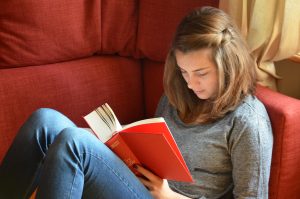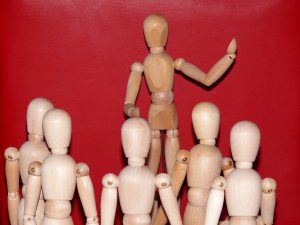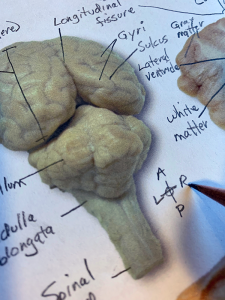01:17 | Feedback in Online Tests
08:17 | The Anatomical Compass
14:47 | Sponsored by AAA
15:12 | Reserve hematopoiesis
18:09 | Sponsored by HAPS
18:54 | Featured: Last Best Story in Adult Neurogenesis & ANS Pathways
If you cannot see or activate the audio player click here.
Questions & Feedback: 1-833-LION-DEN (1-833-546-6336)
Follow The A&P Professor on Twitter, Facebook, Blogger, Nuzzel, Tumblr, or Instagram!
Scientific theories are tested every time someone makes an observation or conducts an experiment, so it is misleading to think of science as an edifice, built on foundations. Rather, scientific knowledge is more like a web. The difference couldn’t be more crucial. A tall edifice can collapse – if the foundations upon which it was built turn out to be shaky. But a web can be torn in several parts without causing the collapse of the whole. The damaged threads can be patiently replaced and re-connected with the rest – and the whole web can become stronger, and more intricate. (Massimo Pigliucci)
1 | Feedback in Online tests
7 minutesIn Episode 36, Adam Rich called in regarding how we can provide feedback to students taking online tests. I responded that I encourage students to get the correct response from their study buddies—or from me. After the episode aired, Krista Rompolski pointed out that this could be a challenge in very large courses. What do y'all think? Tell us. Really.
- Big Year in Anatomy & Physiology Teaching with The A&P Professor | Episode 36
- Here's a tool I use for repeated feedback (saves a LOT of time):
- Sign up for TextExpander. Recall your best words. Instantly, repeatedly.
- We want your feedback!
- 1-833-LION-DEN or 1-833-546-6336
- podcast@theAPprofessor.org
- @theAPprofessor (Facebook, Twitter, Instagram, Pinterest, and beyond)
2 | The Anatomical Compass
6.5 minutesAlthough you and I are comfortable in orienting ourselves to anatomical directions when looking at diagrams, photographs, and specimens in anatomy, our beginning student often are not. The simple process of adding an "anatomical rosette" reflecting the anatomical directions in each encountered diagram can help students develop the skill of understanding anatomical perspective.
3 | Sponsored by AAA
0.5 minutesThe searchable transcript for this episode, as well as the captioned audiogram of this episode, are sponsored by The American Association of Anatomists (AAA) at anatomy.org. Their big meeting is in April at the Experimental Biology (EB) meeting in Orlando FL. Check it out!

4 | Reserve Hematopoiesis
3 minutesHematopoietic stem cells (HSCs) may have a "back-up system" that helps out after damage to the working population. These "reserve" HSCs (rHSCs) may step up when the primed HSCs (pHSCs) cannot keep up with the demand for hematopoiesis.
- Scientists have identified a bone marrow backup system (summary article) my-ap.us/2BmcoE0
- N-Cadherin-Expressing Bone and Marrow Stromal Progenitor Cells Maintain Reserve Hematopoietic Stem Cells
(report by Zhao, et al. in Cell Reports) my-ap.us/2Bk7vLN
5 | Sponsored by HAPS
0.5 minutesThe Human Anatomy & Physiology Society (HAPS) is a sponsor of this podcast. Did you know there's a one-day regional HAPS conference in March? Check it out. You can help appreciate their support by clicking the link below and checking out the many resources and benefits found there.

6 | Featured: Last Best Story in Adult Neurogenesis & ANS Pathways
12 minutesThe "last best story" is what I tell my students I'm providing to them. That approach emphasizes the evolving nature of scientific understanding. In this episode, I mention two stories that are evolving right now.
- Storytelling is the Heart of Teaching A&P | Episode 12 (where I introduce the idea of teaching as storytelling)
- Adult neurogenesis in the brain
- Running Concept Lists Help Students Make Connections | Episode 8 (where I first discuss this story)
- The Discovery of the Neuron (outlines the origin of central dogmas about neuroscience, including Ramón y Cajal's role)
- Neurogenesis in the adult human hippocampus (paper that established the idea that adult brain neurogenesis does occur)
- Human hippocampal neurogenesis drops sharply in children to undetectable levels in adults (paper that challenges the idea of adult brain neurogenesis)
- New Study Questions Confidence in Neurogenesis in the Adult Brain (article that summarizes the recent controversy)
- Are Learning Styles Real? Why or Why Not? | Episode 14 (where I bring up newer research on adult neurogenesis)
- New Evidence Suggests Aging Brains Continue to Make New Neurons (article by Francis Collins on the new paper)
- Human Hippocampal Neurogenesis Persists throughout Aging (new research paper in Cell)
- The last best story in adult neurogenesis?
- A New Look at Neurogenesis in Humans (blog post by Neuroskeptic, summarizing new perspectives) my-ap.us/2TDxTXU
- Recalibrating the Relevance of Adult Neurogenesis (article by Jason S. Snyder in Trends in Neurosciences) my-ap.us/2TEb5r4
- Running Concept Lists Help Students Make Connections | Episode 8 (where I first discuss this story)
- Are sacral autonomic pathways sympathetic or parasympathetic?
- Sacral Efferent Pathways are Sympathetic, Not Parasympathetic (summary from The A&P Professor blog) my-ap.us/2TJMHnS
- The sacral autonomic outflow is sympathetic (I. Espinosa-Medina, O., et al., of J.-F. Brunet lab's in Science the proposed change; includes an updated version of the classic diagram of sympathetic and parasympathetic pathways) my-ap.us/2fNdcF3
- Neural circuitry gets rewired (Adameyko, I. in Science comments on the report cited above, stating that "This finding provokes a serious shift in textbook knowledge, and, as with any fundamental discovery, it brings important practical implications..." and goes on to mention of a few of the implications (e.g., how to treat bladder dysfunction) my-ap.us/2gg9O8P
- The Autonomic Nervous System. Part I. (John Newport Langley's classic "primary source" that codified the modern concept of the ANS.) my-ap.us/2fYHt3M
- The sacral autonomic outflow is parasympathetic: Langley got it right (John P. Horn's commentary in Clinical Autonomic Research; the last best story?) my-ap.us/2TCvwF5
- Sacral Efferent Pathways are Sympathetic, Not Parasympathetic (summary from The A&P Professor blog) my-ap.us/2TJMHnS

If the hyperlinks here are not active, go to TAPPradio.org to find the episode page.
- More details at the episode page.
- Transcript available at the script page.
- Listen to any episode on your Alexa device.
- Join The A&P Professor social network:
- Blog
- Twitter @theAPprofessor
- Facebook theAPprofessor
- Instagram theAPprofessor
- YouTube
Amazon and TextExpander referrals help defray podcasting expenses.
Transcript and captions for this episodeare supported by theAmerican Association of Anatomists.anatomy.org
The Human Anatomy & Physiology Societyalso provides support for this podcast.
theAPprofessor.org/haps
(Clicking on sponsor links helps let them know you appreciatetheir support of this podcast!)
Click here to listen to this episode—or access the detailed notes and transcript.




No comments:
Post a Comment